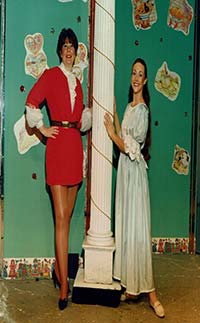
The Twelve Dates of Christmas
Speaker: Susan Holden
Wednesday, 21 December 2022
 On Thursday the 15th of December 2022, our guest speaker was Susan Holden (pictured left), who presented 'The Twelve Dates of Christmas'.
On Thursday the 15th of December 2022, our guest speaker was Susan Holden (pictured left), who presented 'The Twelve Dates of Christmas'.
She began with The Festival of Yule, which covered 4 BC to AD 300, when hunter gatherers would turn into farmers, and gather food to store - a must for winter survival. As not much food could be stored past winter's midpoint, this was the perfect time to bring out the rest of their stored goods. A lot of significance was placed on the Yule log, which burnt throughout the festival of Yule, representing health, fertility, and the concept of life persisting when nature is against you. The log itself was an ancestor of the Christmas tree, and would be doused with wine to enable it to burn for days. Many years later, the Parisian confectioners first represented the Yule log in chocolate.
From 753 BC to AD 325, Roman rule had expanded, conquering many different peoples and cultures. For the most part, worship was permitted of whatever gods the locals preferred. However, with Judaism the Romans had a problem. For the first time, people were worshipping just one God, rather than the numerous ones worshipped by the Romans. One of the local governors appointed by the Romans was King Herod the Great, a fierce tyrant ready to quash any dissent as Rome had decreed him to be King of the Jews in 40 BC.
Herod, perhaps best known through the 'Slaughter of the Innocents', also killed three of his own sons, and his teenage brother-in-law at a party. Becoming ill with kidney disease and gangrene, he was so paranoid that nobody would mourn him, that he had dozens of distinguished and well known citizens killed in the period between his death and his funeral. His reasoning being that people would be mourning and crying for someone, if not for him.
By 336 AD, the Pope in Rome decreed that the actual date of birth for Jesus Christ was the 25th December, and Christianity became the state religion, with worship of any other gods being outlawed. Public celebrations on this date became established within four years.
Susan spoke about 'Little Saint Nick', also known as Saint Nicholas, who was born in 270AD and became the Bishop of Tyra. After inheriting the family wealth, he secretly began quietly dispensing it to those in need, including a local widower with three daughters. The man was poor, and unable to help his daughters to marry well. This might have led to them becoming slaves or prostitutes. Nicholas waited until dark, and placed a bag of gold through the downstairs window of the poor man's house for the eldest daughter.
According to legend, it landed in one of her socks. He repeated the same act for the younger daughters, but this was discovered by their father. Nicholas swore the father to secrecy, but unfortunately word spead of Nicholas's generosity, leading to townsfolk who left stockings outside, on the chance that he might be passing by. Tales of his generosity travelled round the world, helped by sailors, for whom he became the patron saint.
Turning to culinary matters, Susan told us about the origins of what we eat at Christmas. The stirring of the mixture for Christmas pudding initially happened on the last Sunday before advent, with family and friends joining in the stirring of the ingredients – stirred from East to West to mimic the sun, which is represented by the flames when the pudding is lit.
The bird most associated with Christmas, initially the Southern Mexican Turkey, was chosen as it was easy to transport to European, and other ports. Today, one country has a well-known alternative to Turkey on Christmas day. In Japan, American visitors in 1974 were unable to find turkeys and made do with Kentucky Fried Chicken instead. The locals caught on, and now the meal is established as Christmas dinner in that country.
A mixture of civil and religious wars and conflict affected and reduced the numbers of Christmas celebrations and traditions in our country in the 16th and 17th centuries. The outright ban came in 1647, when Parliament passed an ordinance banning Christmas. In its stead, the first Tuesday of each month was designated as a holiday. Also banned at the same time were Christmas Pies, leading to the population changing the shape of them to circular, and renaming them Christmas Puddings.
Christmas returned to England in 1717, a year in which pantomimes, a mixture of 'mumming' plays combined with Italian comedy theatre, becoming popular with families, featuring men and women playing each other, and audience participation.

The reign of Queen Victoria is possibly the time that we all associate with the origins of the Christmas. Susan listed a number of things that started in that period, and which still feature in today's celebrations – carols, Christmas tree decorations, turkey dinners, Boxing Day, paper decorations, the postal service, electric lights and Christmas cards among these.
Charles Dickens introduced notions and images of family and charity and has been said to have 'invented' Christmas. His story about Ebenezer Scrooge's transformation from miser to philanthropist has been told and re-told over the years since its publication in 1843.
Boxing Day's origins are in charitable giving, believed to have started in the late Roman to early Christian era, when Alms boxes were placed in churches to collect special offerings. Servants of wealthier households who were unable to get home for Christmas would be given the day off and would be given a box of leftovers and things to take home for their own families in the Victorian era
In Christmas 1914, the Great War had been in progress for over four months, and trench warfare was becoming established. The pope had suggested a one-day truce for Christmas Day, but this had been rejected by the leaders of each side. Despite this, some of the soldiers in opposing trenches marked the day with greetings, exchanging of presents and food, meeting in no man's land, and legendary games of football. This raised questions amongst both sides about the pointlessness of them killing each other. The Generals and other leaders were having none of this though, and the war subsequently carried on.
On Christmas Day 1923, a Christmas day speech from the monarch was heard on the radio for the first time. King George V was initially reluctant but spoke to the nation at 3pm. The speech, written by Rudyard Kipling, was such a success that the King became known by some people as 'Grandfather Christmas'.
This completed Susan's talk, which had also contained many other anecdotes and jokes, leading to a well-deserved round of applause.
The meeting also included mince pies and fruit punch for the members, and our now traditional, and challenging, Christmas Quiz. We look forward to even more interesting and absorbing presentations in 2023.
The next Todmorden U3A Monthly Members Meeting will be on Thursday the 19th of January 2023 at 1.45 p.m., open to all fully paid-up members at the Central Methodist Hall, Todmorden. The speaker for this meeting is Charlotte Gringras, with: 'It wasn't all about the Pankhursts'
Not yet a member? You can attend one talk free by requesting an invitation to this zoom event. We're always delighted to welcome new members. Contact details: website at www.u3atod.org.uk or email at info@u3atod.org.uk.
Many thanks to Colin Sanson for this report
Previous U3A reports on the HebWeb - click here

